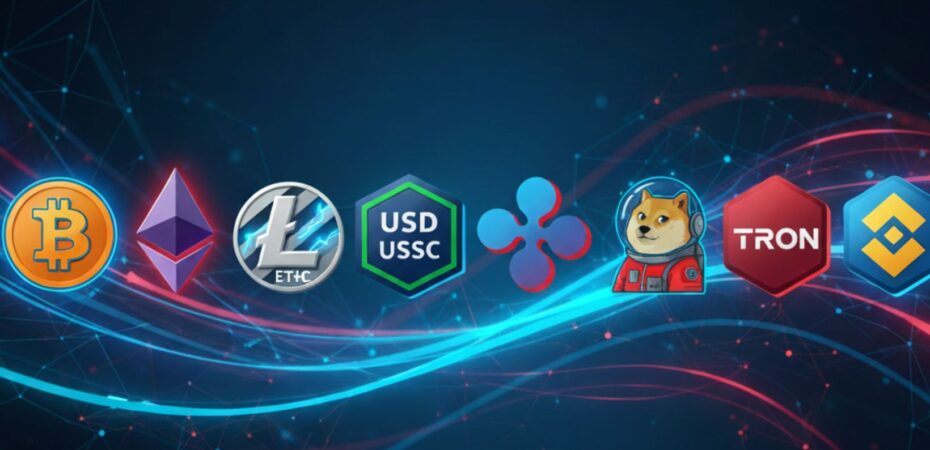Crypto casinos aren’t “niche” anymore. For a lot of players, they’re just the default way to gamble online: faster cashouts, bigger welcome packages, and no bank clerk staring at a weird gambling statement on your account. Behind all that is one simple decision that people still overthink – which coin to use.
Online casinos used to be almost 100% Bitcoin. Today, cashier pages look like mini CoinMarketCap lists. Bitcoin and Ethereum are still the leading options, but you’ll routinely see Litecoin, Dogecoin, Tether, USDC, XRP, TRON, BNB, Bitcoin Cash and more sitting side by side, each with slightly different fees, speed and risk.
From a player’s point of view, the “best” coin usually boils down to three things: how quickly deposits land, how painful the network fees feel on small bets, and how much price swings bother you between depositing and cashing out. Get that balance right and everything else – bonuses, games, loyalty rewards – becomes much easier to enjoy.
Now look at BetFury, one of the most aggressive crypto-first casinos in 2025. It runs more than 10,000 games and supports dozens of coins, from BTC and ETH to Litecoin, Dogecoin, TRON, USDT, BNB, USDC and a long list of smaller tokens, all wrapped in a huge welcome package that can reach $10,500 plus hundreds of free spins. If you want to see what smooth Litecoin gambling feels like in practice, BetFury is a good benchmark: at this Litecoin Casino you get near-instant deposits, low fees, and a cashier that doesn’t force you into just one asset.
Highest Casino Coins at a Glance
| Coin (Ticker) | Type | Typical Confirmation Time* | Fees (Relative) | Price Stability | Best Use in Casinos |
|---|---|---|---|---|---|
| Bitcoin (BTC) | Base layer cryptocurrency | 10–60 minutes | Medium–high | Very volatile | Big wins, long-term store, “default” |
| Ethereum (ETH) | Smart-contract platform | 15 seconds–5 minutes | Medium | Very volatile | Web3 casinos, NFTs, on-chain games |
| Litecoin (LTC) | Payments-focused coin | 2–10 minutes | Low | Volatile | Regular deposits, mid-sized bets |
| Tether (USDT) | USD-pegged stablecoin | 1–10 minutes (chain-based) | Low–medium | Pegged to $1 | Locking in value, bankroll management |
| USD Coin (USDC) | USD-pegged stablecoin | 1–10 minutes (chain-based) | Low–medium | Pegged to $1 | Safer bankroll, avoiding swings |
| Ripple (XRP) | Payment network token | Seconds–2 minutes | Very low | Volatile | Fast cashouts, cross-border deposits |
| Dogecoin (DOGE) | Meme coin | 1–10 minutes | Low | Very volatile | Casual play, micro-bets, fun factor |
| TRON (TRX) | Smart-contract platform | Under 1 minute | Very low | Volatile | Low-fee grinding, frequent small bets |
| Bitcoin Cash (BCH) | Bitcoin fork | 10–30 minutes | Low | Volatile | Larger payments with lower fees |
| Binance Coin (BNB) | Exchange token | Seconds–1 minute | Very low | Volatile | Fast, cheap deposits on BNB Chain |
Before diving into the details, here’s a quick comparison of the ten coins you’ll most often see at serious crypto casinos. *Times are approximate and depend on the specific network settings and casino confirmation policy. Casinos often wait for more confirmations on large deposits, especially with Bitcoin-based assets.
The Highest 10 Cryptocurrencies Explained
1. Bitcoin (BTC) – Still the default
Bitcoin is still the coin you’ll see on almost every crypto casino cashier screen. It’s the one regulators understand best, the one auditors expect to see in a treasury, and the one high-rollers often use for big six-figure transfers in and out.
The downside is obvious: network fees spike during busy periods, and confirmation times can stretch, especially when casinos demand multiple confirmations for security. BTC works well if you deposit chunky amounts less frequently, keep part of your bankroll parked in it, and don’t mind waiting a little longer for large withdrawals.
2. Ethereum (ETH) – For Web3-heavy casinos
Ethereum is the backbone for many “next-gen” gambling projects: provably fair on-chain games, NFT-based loyalty programs, and decentralized casinos where your wallet is your account. Gas fees used to make small bets painful, but newer scaling solutions and cheaper L2 networks have pushed typical costs down for most casual users.
If you’re playing at a casino that integrates DeFi pools, NFT rewards, or smart-contract jackpots, ETH is usually the most natural choice. The trade-off is still volatility – the value of your winnings can move a lot between Sunday night and Monday morning.
3. Litecoin (LTC) – Everyday workhorse
Litecoin was designed as “digital silver” – lighter and faster than Bitcoin. Block times are shorter, fees are usually a fraction of BTC, and support across casinos is very strong, especially at multi-coin brands like BetFury.
In practice, that makes LTC ideal for players who deposit and withdraw often but don’t necessarily want to deal with multiple stablecoins or meme coins. Spin a few slots, cash out a mid-sized win, and still keep network fees under control.
4. Tether (USDT) – The bankroll stabilizer
Tether is the most widely used stablecoin in online gambling. Many casinos now list it right next to BTC on the cashier page, often across several networks (TRON, Ethereum, BNB Chain) so players can pick their preferred fee/speed combo.
The appeal is simple: your casino balance stays near $1 per token. If you hate seeing a big win shrink because the market dumped overnight, you park your bankroll in USDT, move in and out of other coins only when you really need to. Just remember you’re trusting a centralized issuer, not a purely decentralized asset.
5. USD Coin (USDC) – The “clean” stablecoin
USDC plays a similar role to USDT but with a slightly different reputation profile. It puts more emphasis on regulated reserves and transparency, which is why a growing list of casinos now includes it alongside Tether for risk-sensitive users and bigger bettors.For you as a player, the experience is almost identical: stable value, multiple supported chains, and low-to-medium fees depending on the network. USDC works especially well if you switch between casinos frequently and want a fairly “boring” asset that behaves like digital dollars.
6. Ripple (XRP) – Fast cashout specialist
XRP’s strength is speed. Transfers reach casinos in seconds in many cases, and fees are tiny compared with older chains. That’s why XRP shows up more and more among recommended casino coins for players who care about quick cross-border payments.
The flip side: you’re dealing with a token that lives in a pretty complex regulatory environment and doesn’t have the same meme-value as BTC or DOGE. Use XRP when your priority is in-and-out movement of funds, not long-term holding.
7. Dogecoin (DOGE) – Meme coin with real usage
Dogecoin started as a joke. Casinos helped turn it into a serious payment method. Plenty of crypto casinos let you spin slots, fire up crash games, or bet on sports using DOGE, and the community loves the idea of “degenerate” gambling with a meme coin.
Fees are typically low, and transfers are quick enough for everyday use. The real risk is brutal volatility – big moves up or down happen all the time. Most players treat DOGE as a fun side bankroll, not their main store of value.
8. TRON (TRX) – Low-fee volume machine
TRON became a favorite for casinos and betting sites largely because of its cheap, fast transactions. USDT on TRON is now one of the most common combinations across gambling platforms; casinos like the fact that high-volume players can deposit and withdraw frequently without killing margins on network fees.

TRX itself is often supported as a base coin alongside that, giving you a low-fee option for regular bets, especially if you grind slots or live casino games with constant small transfers. Just be aware you’re tying yourself to a single ecosystem controlled by a small group of validators.
9. Bitcoin Cash (BCH) – Bigger blocks, cheaper transfers
Bitcoin Cash split off from Bitcoin to prioritize bigger blocks and lower fees. For casinos, that means a coin that feels familiar in branding and infrastructure, but with cheaper and often faster payments under normal network conditions.
You’ll see BCH supported on many of the same sites that already cater to heavy Bitcoin users, BetFury included. It’s useful if you like the “Bitcoin feel” but don’t want to pay BTC-level fees every time you top up your balance.
10. Binance Coin (BNB) – Exchange-driven option
BNB rides on the back of Binance’s trading ecosystem and its own high-throughput chain. Casinos that integrate BNB Chain get fast confirmations and low costs, which is why you see BNB listed next to BTC, ETH, and USDT at a growing number of brands.
For players, BNB works nicely if you already trade on Binance, move funds between trading and gambling, and want a single coin for both. Just remember that you’re linking your gambling funds quite closely to one exchange’s business and regulatory fortunes.
How BetFury Uses These Coins in Practice
BetFury is a good case study for how modern casinos treat crypto in 2025. It sits in rankings of decentralized and Web3-style casinos thanks to a huge game library, provably fair titles, and a cashier that supports over fifty cryptocurrencies plus on-ramp options via bank cards and mobile wallets.
On BetFury you can:
- Deposit with “classic” coins like BTC, ETH, LTC and BCH
- Use stablecoins such as USDT and USDC to keep a steady bankroll
- Play with meme coins like DOGE or SHIB if you’re chasing fun rather than stability
- Withdraw winnings instantly in the asset you actually want to hold
For a newcomer, browsing a BetFury cashier for five minutes tells you more about real-world casino coin demand than any whitepaper. The mix is heavy on coins that combine strong liquidity, solid exchange support, and low enough fees for day-to-day usage.
Practical Tips for Choosing Your Casino Coin
A few simple rules keep you out of trouble:
- Match coin to stake size.
- Micro-stakes or frequent small bets: TRX, DOGE, LTC, or BNB-chain tokens tend to hurt less on fees.
- Larger, occasional deposits: BTC, ETH, or BCH are fine if you’re not moving money every hour.
- Use stablecoins for “parking.”
If you’re not actively playing, consider shifting part of your casino balance to USDT or USDC so it doesn’t swing wildly with the market. Many pro gamblers treat stablecoins as their base roll and only swap into volatile assets when promotions or personal strategy demand it. - Check which network the casino uses.
USDT on TRON behaves very differently from USDT on Ethereum in terms of fees. Same ticker, different cost structure. Always double-check the network shown in the cashier before sending funds from your wallet. - Stick to coins with real exchange liquidity.
Every coin in the top 10 list above has deep markets on major exchanges. That matters when you want to cash out to fiat quickly at a decent rate. Tiny speculative tokens offered by fringe casinos might look fun, but off-ramping them can be a headache. - Think about regulation and KYC.
Even at crypto-only casinos, you may hit KYC checks for very big withdrawals. Keeping most of your action in well-known coins like BTC, ETH, USDT, USDC, or LTC tends to fit better with current compliance trends than trying to run everything through obscure assets.
Wrapping Up
Crypto casinos in 2025 are less about “which site even accepts Bitcoin?” and more about picking the right tool from a crowded shelf of coins. Bitcoin remains the flagship, Ethereum powers the Web3 side of the industry, Litecoin and TRON handle a lot of everyday traffic, and stablecoins quietly carry the serious bankrolls in the background.
BetFury and similar multi-coin platforms show where things are going: dozens of supported assets, instant withdrawals, and a mix of volatile and stable options so every type of player can find a comfort zone. Choose your coin with fees, speed, and risk in mind – and the gambling itself becomes the interesting part, not the payments plumbing behind it.


 By
By 





